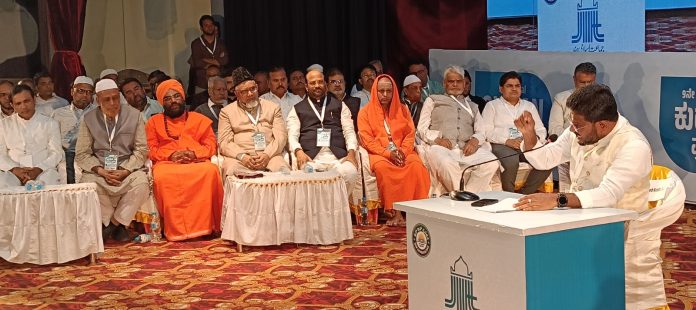– Mohammed Talha Siddibapa
In the historic town of Basavakalyan – revered as the Karma Bhoomi and the land of Basaveshwara’s profound teachings – an extraordinary gathering unfolds each year, unlike anything you’ve ever seen. This isn’t a star-studded concert, a political rally, or a comedy night – it’s a spiritual experience that connects hearts and breaks barriers. Thousands of men and women from Basavakalyan and neighbouring villages converge at the Sabha Bhavan, not for entertainment, but to immerse themselves in the timeless wisdom of the Quran.
For the past nine years, this event has been a shining example of faith in action, with the eloquent speaker Mohammed Kunhi delivering the Quran’s universal message in a way that touches the core of every listener. What makes this gathering truly extraordinary? The sight of Hindus, Muslims, and Christians sitting together in perfect harmony, reflecting India’s rich legacy of unity and mutual respect.
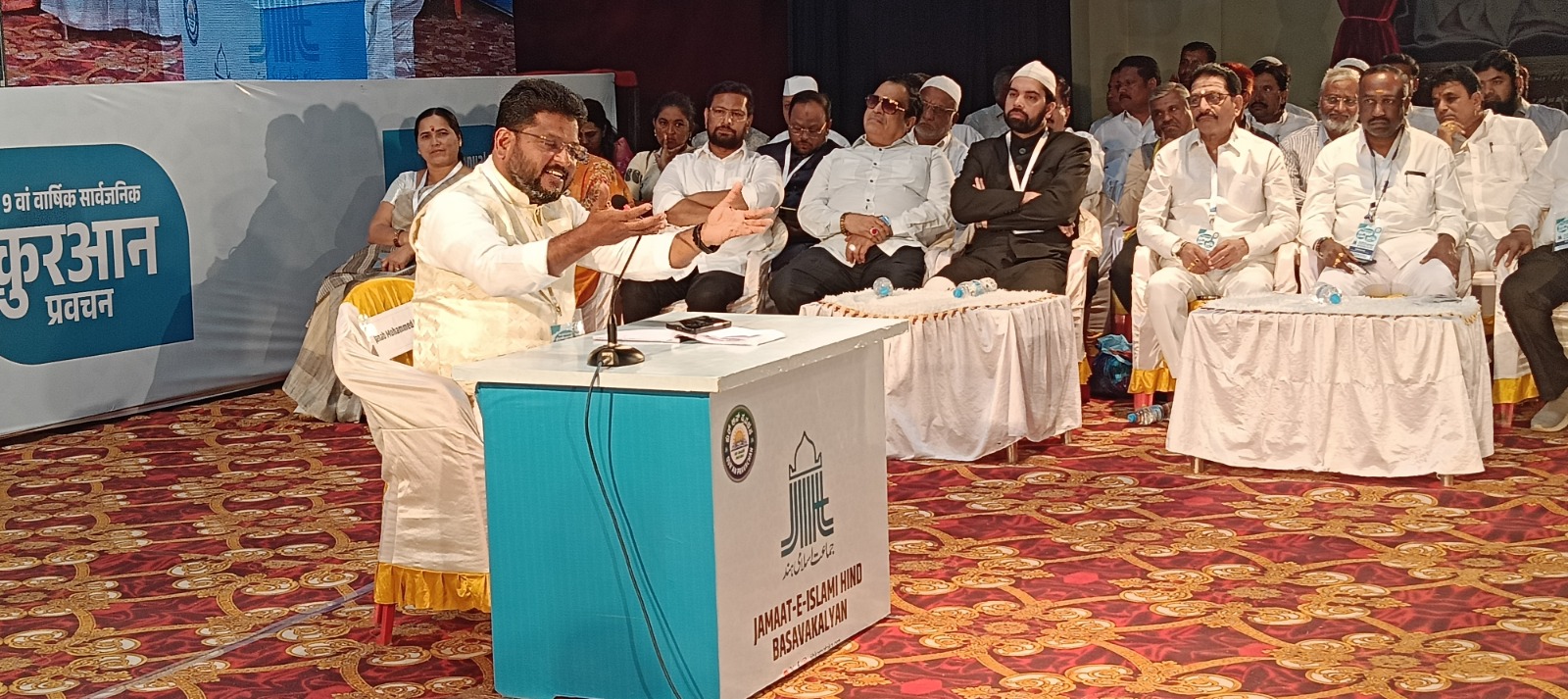 Basavakalyan’s Quran Pravachan is more than an event – it’s a celebration of humanity’s shared spiritual thirst, and a call to embrace the Quran’s eternal message of peace and compassion. Be a part of this remarkable story in the very land where Basaveshwara once shared his transformative ideals of equality, service, and love – a legacy that lives on in every heart that gathers here.
Basavakalyan’s Quran Pravachan is more than an event – it’s a celebration of humanity’s shared spiritual thirst, and a call to embrace the Quran’s eternal message of peace and compassion. Be a part of this remarkable story in the very land where Basaveshwara once shared his transformative ideals of equality, service, and love – a legacy that lives on in every heart that gathers here.
Day One: The Universal Value of Human Dignity
The inaugural day of the Quran Pravachan set a compelling tone, exploring the theme of “Human Dignity” under the guidance of Muhammad Kunhi. As he stepped onto the stage, the air in the Sabha Bhavan buzzed with anticipation, the audience leaning forward to catch every word.
Kunhi opened with a powerful declaration, quoting the timeless words of the Quran: “We have certainly honoured the children of Adam.” (Quran 17:70)
He paused to let the weight of the verse settle over the audience before elaborating, “This is not just a statement; it’s a divine proclamation that every human being is honoured by Allah – regardless of race, colour, or social status. This honour is not earned; it is intrinsic, a birth right bestowed by the Creator.”
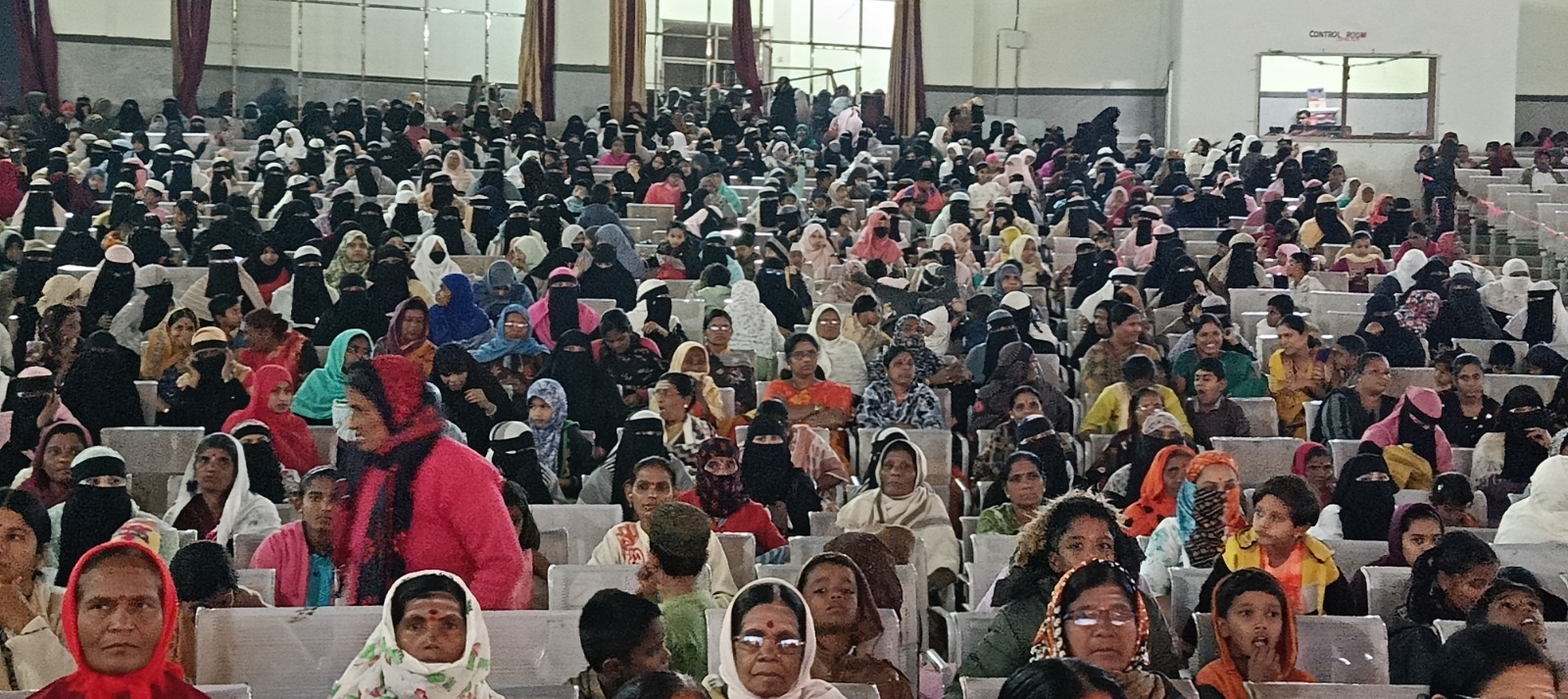 Kunhi’s eloquence captivated the crowd as he intertwined his message with vivid examples from the life of Prophet Muhammad ﷺ. He shared the inspiring story of Bilal ibn Rabah, a man who rose from the chains of slavery to become one of the most revered figures in Islamic history. With each anecdote, Kunhi painted a picture of a society that not only preaches equality but lives it – centuries ahead of its time.
Kunhi’s eloquence captivated the crowd as he intertwined his message with vivid examples from the life of Prophet Muhammad ﷺ. He shared the inspiring story of Bilal ibn Rabah, a man who rose from the chains of slavery to become one of the most revered figures in Islamic history. With each anecdote, Kunhi painted a picture of a society that not only preaches equality but lives it – centuries ahead of its time.
“Islam doesn’t just talk about equality,” Kunhi declared, his voice carrying through the hall, “it embodies it, practices it, and demands it from every follower. The dignity of humanity is sacred, and safeguarding it is not optional – it’s an obligation.”
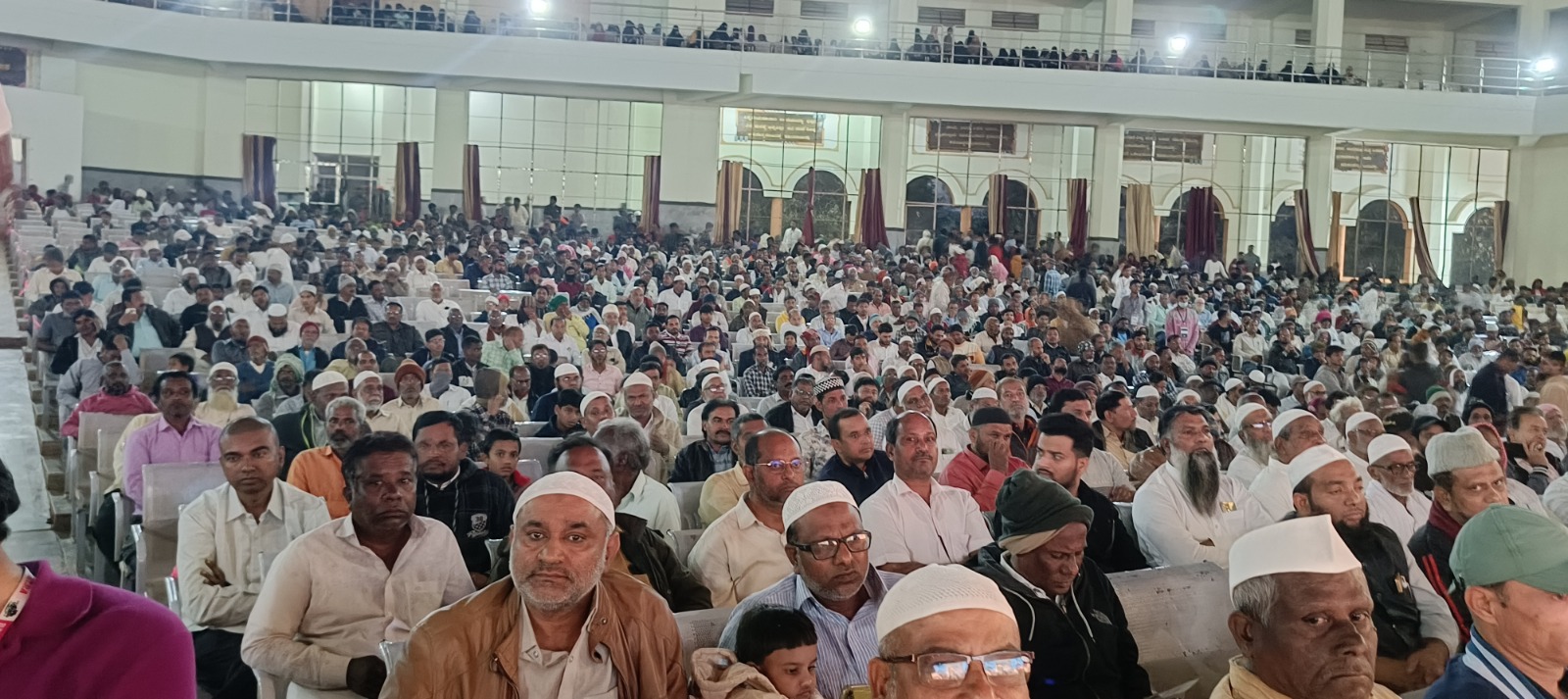 His words struck a chord, drawing nods of agreement and moments of reflection from the audience. Hindus, Muslims, and Christians sat side by side, visibly moved by the universal relevance of the message. For many, this was not just a reminder but a call to action – to see the divine in every individual and honour the shared humanity that binds us all.
His words struck a chord, drawing nods of agreement and moments of reflection from the audience. Hindus, Muslims, and Christians sat side by side, visibly moved by the universal relevance of the message. For many, this was not just a reminder but a call to action – to see the divine in every individual and honour the shared humanity that binds us all.
“As we proudly claim ourselves to be cultured and champions of human rights,” Kunhi continued, “can we ignore the glaring truth of our time? Even today, in the so-called modern era, the worth of an African Negro in America or Europe is not equal to his white counterpart. Is this not the harsh reality of the 21st century?
“While human rights declarations falter under the weight of prejudice and inequality, the divine message of the Quran stands firm, timeless, and just. If upheld, it is the only path to a truly peaceful and equitable society.”
In the land of Basaveshwara, where the principles of equality and justice have long been celebrated, Kunhi’s message carried a special depth. It echoed the teachings of Basaveshwara himself, who championed the dignity and worth of every human being.
Day One of the Quran Pravachan didn’t just set the stage for the days to come – it ignited a spark of introspection, unity, and hope. It reminded everyone present that the legacy of this sacred land is one of harmony and shared values, a light for a world often divided by differences.
Dr. Muhammad Saad Belgami, the Ameer-e-Halqa and head of JIH Karnataka, later reflected on the profound impact of the day’s session. Speaking with a sense of deep conviction, he remarked:
“This theme is a powerful reminder that human dignity is universal. It is not something granted by governments or societies – it is bestowed directly by Allah. Events like these are crucial in reinforcing this timeless truth, inspiring us to live lives rooted in respect and equality for all.”
The session, organised by JIH Basavakalyan, left a lasting impression on attendees. At the end of the day, many were eager to share their thoughts and experiences. One young man, visibly moved, said, “I never realised how deeply the Qur’an emphasises equality. Today’s session has opened my eyes to a new perspective on what it truly means to respect others and honour their dignity.”
This gathering wasn’t just an event; it was a transformative experience – a celebration of the Quran’s eternal message in a land steeped in the legacy of Basaveshwara’s teachings. Through the efforts of JIH Basavakalyan, it served as a bridge connecting timeless wisdom with the challenges and aspirations of the modern world.
Day Two: Women and Child Security – A Call to Action
The second day explored a vital and deeply meaningful theme: “Women and Child Security.” Muhammad Kunhi opened the session with a sobering critique of the realities in contemporary Indian society, shedding light on the disturbing prevalence of crimes against women and children. His piercing words held the audience spellbound:
“In today’s India, even young girls and elderly women are not safe – not even within their own homes. From sexual abuse to harassment, the failure is not just societal; it begins within the very fabric of families.”
He narrated a heart-wrenching story of a woman who revealed that her son was raping her, while her husband – the boy’s father – stood by as a silent spectator.
“How heinous is this?” Kunhi questioned, his voice heavy with sorrow and conviction. “When families crumble in morality, society follows. The Qur’an offers us solutions – practical, timeless, and transformative – that, if followed, can eradicate these evils.”
Kunhi attributed much of this crisis to a male-dominated mindset that fails to see women as equals. “Even in marriage, husband and wife are not viewed as partners, but the Qur’an calls them a pair – one that completes and complements each other.”
He quoted the divine wisdom:
“And among His wonders is this: He creates for you mates out of your own kind.” (Qur’an 30:21)
Kunhi elaborated on the Quranic perspective, emphasising that men and women are not adversaries but essential partners in building a just and harmonious society. He further drew on the verse:
“They are clothing for you, and you are clothing for them.” (Qur’an 2:187)
This verse, he explained, signifies mutual care, respect, and protection, with both genders tasked to uphold each other’s dignity.
The speaker passionately described how Islam’s principles of modesty, mutual accountability, and justice establish an environment where exploitation and harm are inconceivable.
“The Prophet Muhammad ﷺ didn’t merely speak of women’s rights – he lived them, implementing a transformative vision in a society that once dehumanised women,” Kunhi declared.
“He uplifted women, granted them rights, and restored their dignity – principles that are just as crucial in today’s world as they were in his time.”
The session left the audience in deep reflection. One young father, cradling his daughter, remarked, “This reminded me of my duty – not just as a father but as a human being – to teach my child respect and empathy. It’s clear that each of us has a role in shaping a world where women and children are secure.”
Muhammad Yusuf Kunhi, the secretary of JIH Karnataka, later added his insights:
“Laws alone will not solve these issues. It is only through education, awareness, and a foundation of spiritual values that we can cultivate a society where women and children feel truly safe.”
The second day of the Quran Pravachan was not just a discussion; it was a call to action – a reminder that the teachings of the Quran offer a clear and actionable path to a society rooted in respect, safety, and justice for all.
Day Three: Reflecting on the Purpose of Life
The final day brought the audience face-to-face with an introspective and deeply profound theme: “The Purpose of Life.” Muhammad Kunhi’s address was a heartfelt call for self-reflection, urging attendees to confront the deeper questions that often get overshadowed by life’s distractions: “Why are we here? Who created us? And what happens after we die?”
Kunhi explained that, as outlined in the Qur’an, life is not an end in itself but a test – a temporary journey where every action, decision, and intention shapes our ultimate destiny. He quoted the powerful verse:
“And I did not create the jinn and mankind except to worship Me.” (Qur’an 51:56)
Expounding on the verse, he reminded the audience that the purpose of life is intrinsically tied to worship – not limited to rituals, but encompassing a way of life that aligns with the Creator’s guidance. True success, he emphasised, lies in living a meaningful life of service, integrity, and devotion.
The session resonated deeply with attendees, sparking moments of personal contemplation. One elderly man, visibly moved, shared his reflection: “I’ve spent so much of my life consumed by worldly pursuits. Today’s message was a wake-up call – a reminder that life is fleeting, and there’s a higher purpose I must strive to fulfil.”
Before concluding his dynamic speech, Kunhi made a passionate appeal to all communities, urging them to come together on common terms to build harmony in society. Quoting the Qur’anic verse:
“Let us come to an agreement on that which is common between us.”
He explained that the wisdom of the Quran lies in seeking common ground as the foundation for unity. “This,” he emphasised, “is the path to societal harmony – to focus on shared values that can bring us together rather than divide us.”
This part of his speech resonated far beyond the Sabha Bhavan, as a clip of it quickly went viral on social media. Short clips from his speeches, filled with inspiring and thought-provoking messages, have garnered lakhs of views across various platforms, reflecting the powerful impact of his words.
The final day of the Quran Pravachan concluded not just with words but with a renewed sense of purpose in the hearts of the audience. In a world often preoccupied with the material, the session stood as a powerful reminder of life’s spiritual dimension and the eternal rewards that await those who live in harmony with their Creator’s will.
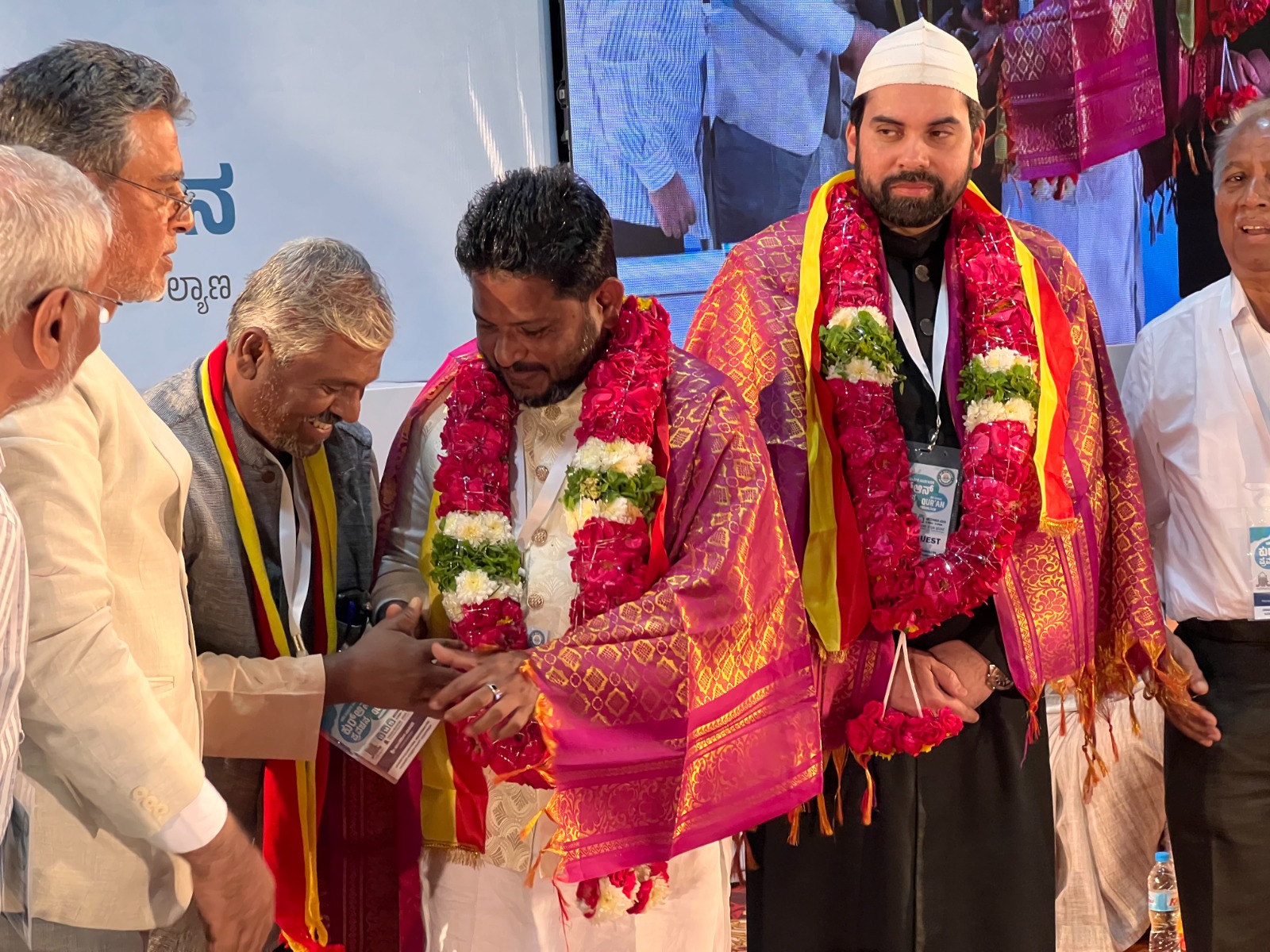 After completing his speeches on all three days, an extraordinary scene unfolded as the audience surged toward the stage, eager to shake hands with Muhammad Kunhi and take selfies with him. Some attendees even honoured him with garlands and shawls, a heartfelt gesture of their admiration and respect.
After completing his speeches on all three days, an extraordinary scene unfolded as the audience surged toward the stage, eager to shake hands with Muhammad Kunhi and take selfies with him. Some attendees even honoured him with garlands and shawls, a heartfelt gesture of their admiration and respect.
But this wasn’t merely a display of affection for Muhammad Kunhi as an individual. It was a testament to the deep connection the people of Basavakalyan felt for the powerful Quranic interpretations he delivered in their own language. It was a reflection of their love for spirituality, their yearning for truth, and their hunger to understand the greater purpose of life.
Through his eloquent words, Kunhi had not just spoken to their minds – he had touched their hearts, awakening a renewed sense of faith and introspection in the land of Basaveshwara.
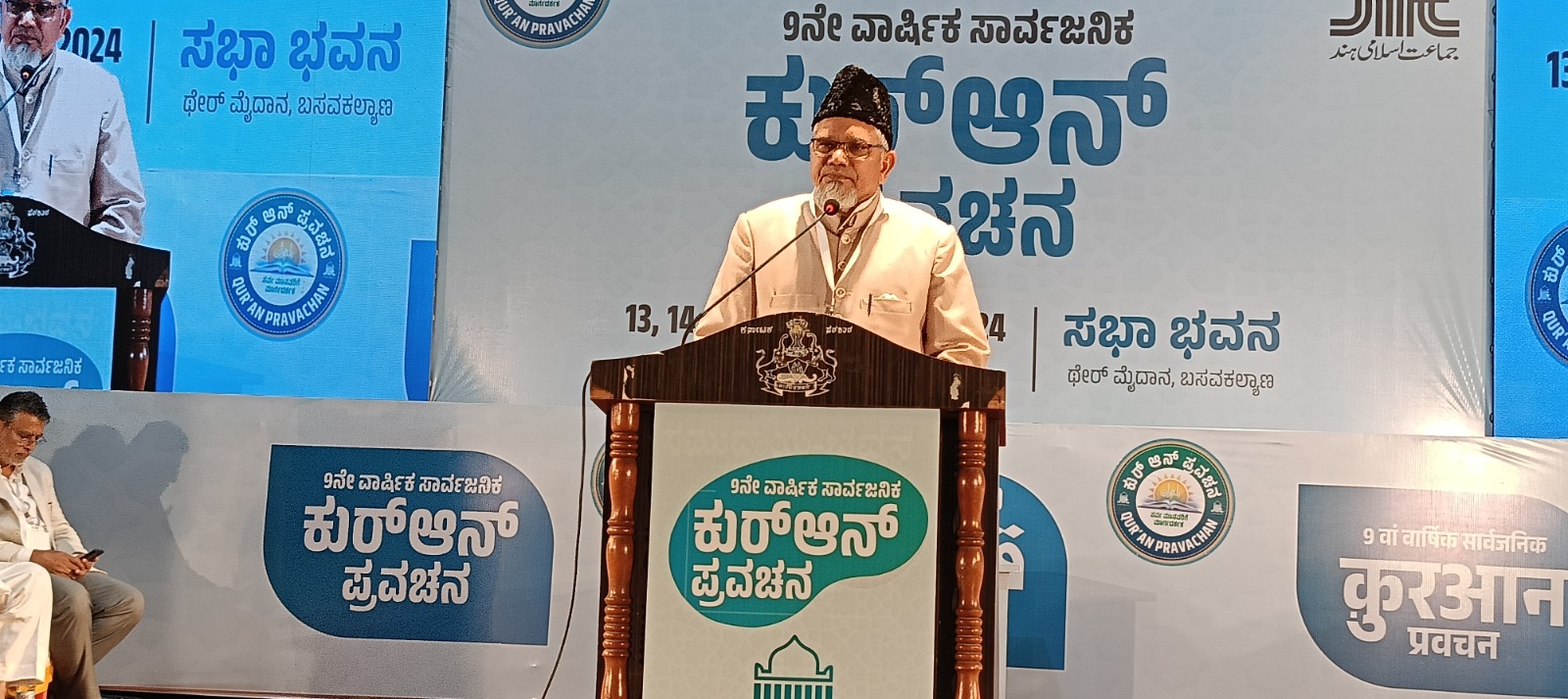 The programme garnered admiration from leaders across various faiths and communities, standing as a shining example of unity in diversity. Among the distinguished guests was Engineer Mohammed Salim, Vice President of JIH, who travelled all the way from Delhi to witness the transformative event. His words carried a message of hope and encouragement as he praised the organisers for their inclusive approach.
The programme garnered admiration from leaders across various faiths and communities, standing as a shining example of unity in diversity. Among the distinguished guests was Engineer Mohammed Salim, Vice President of JIH, who travelled all the way from Delhi to witness the transformative event. His words carried a message of hope and encouragement as he praised the organisers for their inclusive approach.
“The way this programme brings together people from all walks of life, cutting across religious and social boundaries, is truly remarkable,” Er. Salim remarked. “This is not just about sharing the Quran’s message – it is about creating a platform for dialogue, understanding, and genuine harmony. The organisers have set a powerful example by involving individuals from every community, showing us what is possible when hearts and minds come together in pursuit of higher values.”
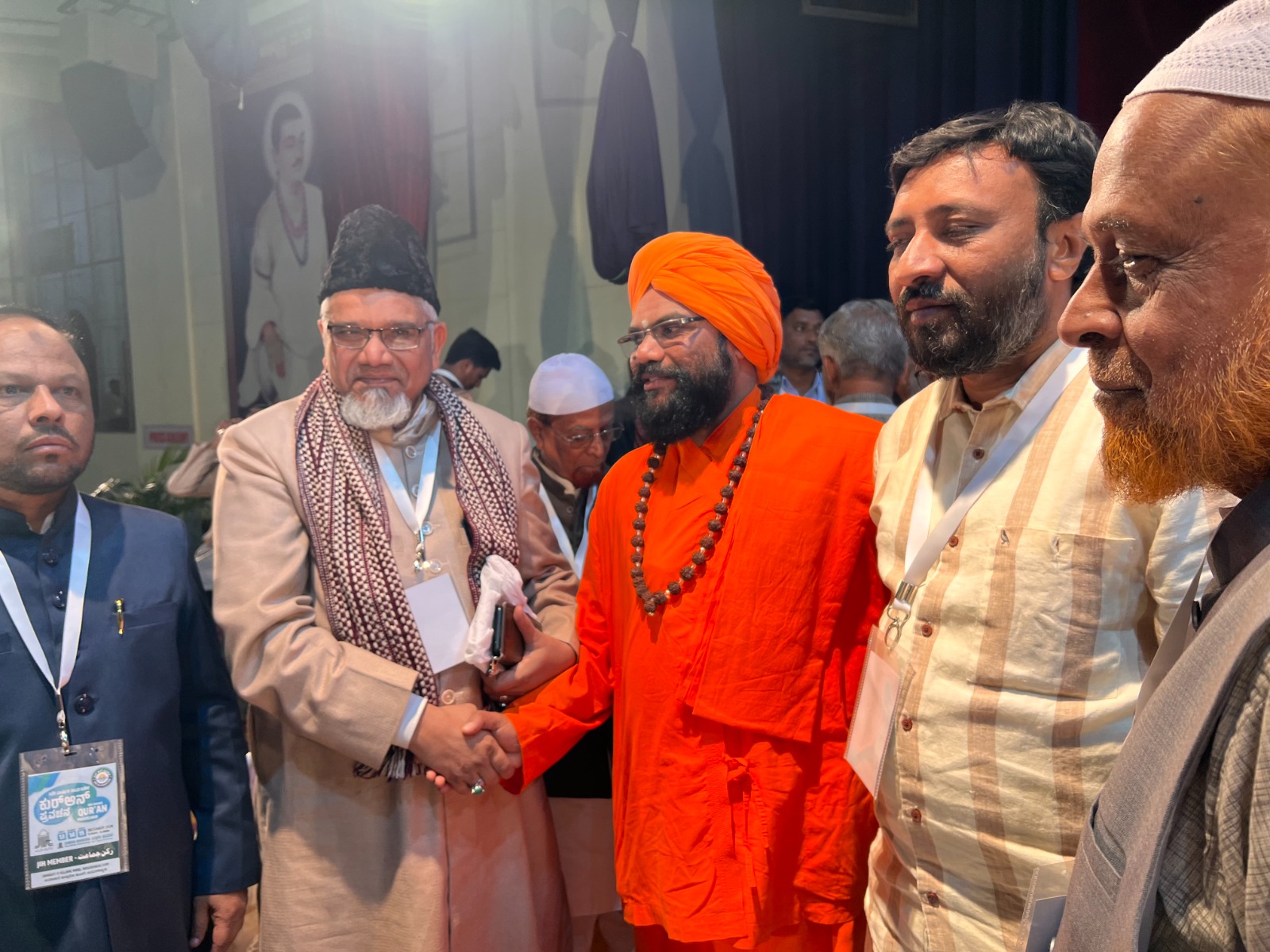 He further emphasised the need to replicate this model across the nation. “India needs programmes like these more than ever. This is the way forward – to bridge divides, nurture shared values, and create spaces where love and understanding can thrive. I assure you, I will take this inspiring experiment to others and encourage them to follow in your footsteps. Events like these are the true spirit of India.”
He further emphasised the need to replicate this model across the nation. “India needs programmes like these more than ever. This is the way forward – to bridge divides, nurture shared values, and create spaces where love and understanding can thrive. I assure you, I will take this inspiring experiment to others and encourage them to follow in your footsteps. Events like these are the true spirit of India.”
Swami Shri Basava Prabhuji, a revered Lingayat spiritual leader, also shared his admiration for the event with an energy that electrified the audience. His voice carried the weight of Basavakalyan’s rich spiritual heritage as he declared:
“This gathering is a living tribute to the teachings of Basavanna and the spirit of Basavakalyan – a land that has always stood for love, harmony, and justice. The Qur’anic wisdom shared here today is not just for one faith or one community; it is a light of hope and unity in these challenging times. Such programmes strengthen our collective spirit and remind us of the shared values that bind us as human beings.”
High Court Advocate Rajeshwari added a deeply personal reflection, saying, “For three days, I sat among people of different faiths, listening to wisdom that goes beyond the boundaries of religion. It was not just a gathering – it was an experience that renewed my faith in humanity. This is the India we should strive for – a land where unity and mutual respect are not ideals but realities.”
These words of admiration, spoken by respected leaders, underscored the profound impact of the Quran Pravachan. It wasn’t merely an event; it was a movement – a testament to the power of faith, understanding, and the timeless truths that inspire individuals and communities to rise above division and walk the path of unity.
A Legacy of Hope
As the event concluded, the vast Sabha Bhavan pulsed with conversations filled with hope and the promise of change. Attendees departed with a renewed sense of purpose, their hearts carrying the programme’s profound message: that the teachings of the Quran, when embraced with sincerity, have the power to reshape not just lives but entire societies.
The three-day “Message of the Quran” programme in Basavakalyan was not merely an event – it was a journey. Like a river that carves its path through stone, it etched the timeless values of faith, humanity, and unity into the hearts of all who attended. For many, it was more than a call to action – it was a spark of transformation, igniting the belief that change begins within and radiates outward, binding people together in the light of shared truths.


